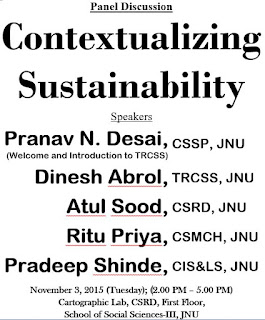PC Joshi Archives on Contemporary History
School of Social Sciences, JNU and
Rosa Luxemburg Stiftung, South Asia - INSAF
Invite you to a lecture on
The Euro, the Crisis and the Future of the European Union
By
Prof. Michael Heinrich
University of Applied Sciences, Berlin
Wednesday 2nd December 2015 3.00 pm
Venue: Committee Room, Ground Floor, School of Social Sciences I.
Prof. Michael Heinrich teaches Economics in University of Applied Sciences, Berlin and is Managing Editor of PROKLA: Journal for Critical Social Science.
The Lecture will focus on the banking crisis of 2008 overcome by an enormous intervention of the European states. The consequence was a state debt crisis. However this state debt crisis hit the members of the EU in rather different ways and degrees. Especially the southern member states, Portugal, Spain and especially Greece had and have huge problems, while Germany is the clear winner of the crisis. This unequal situation creates the biggest challenge the EU ever saw.
Tea at 4.30 pm



